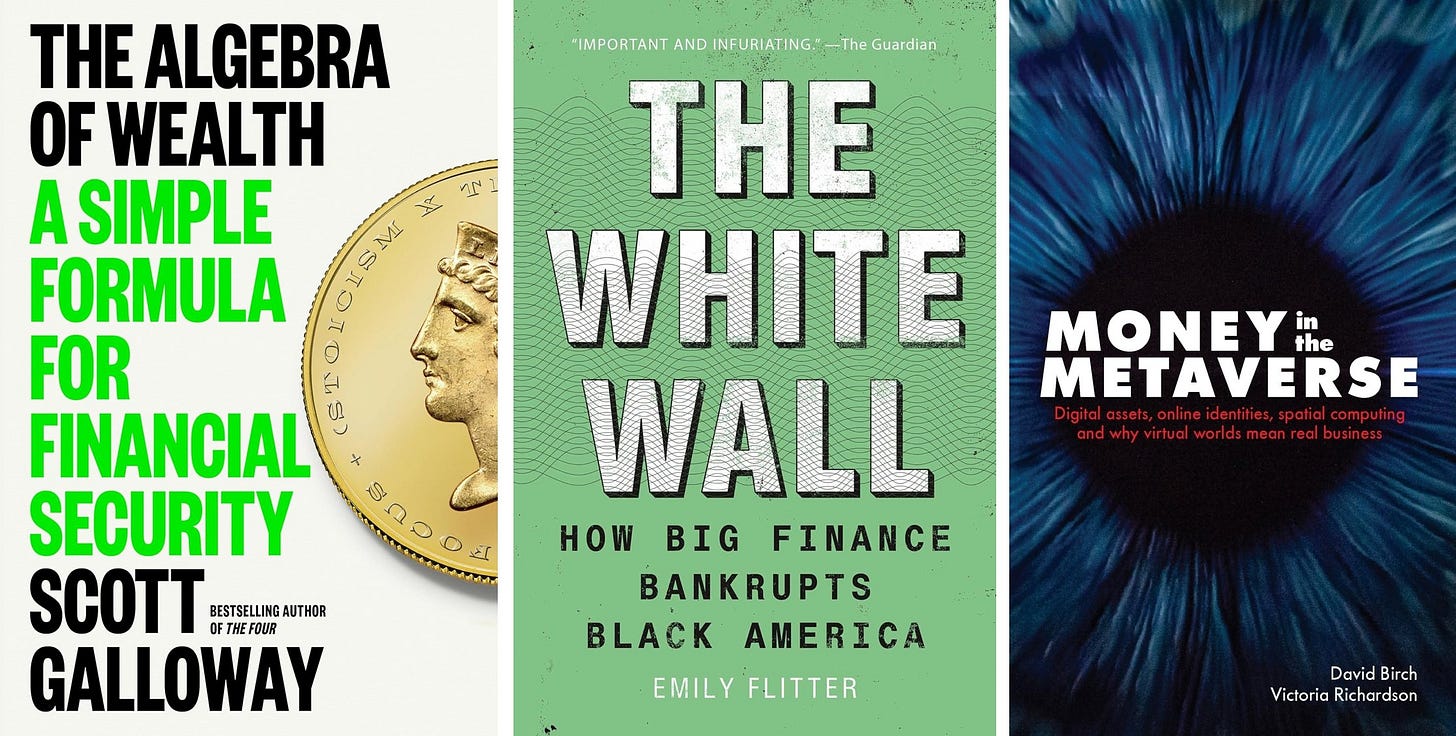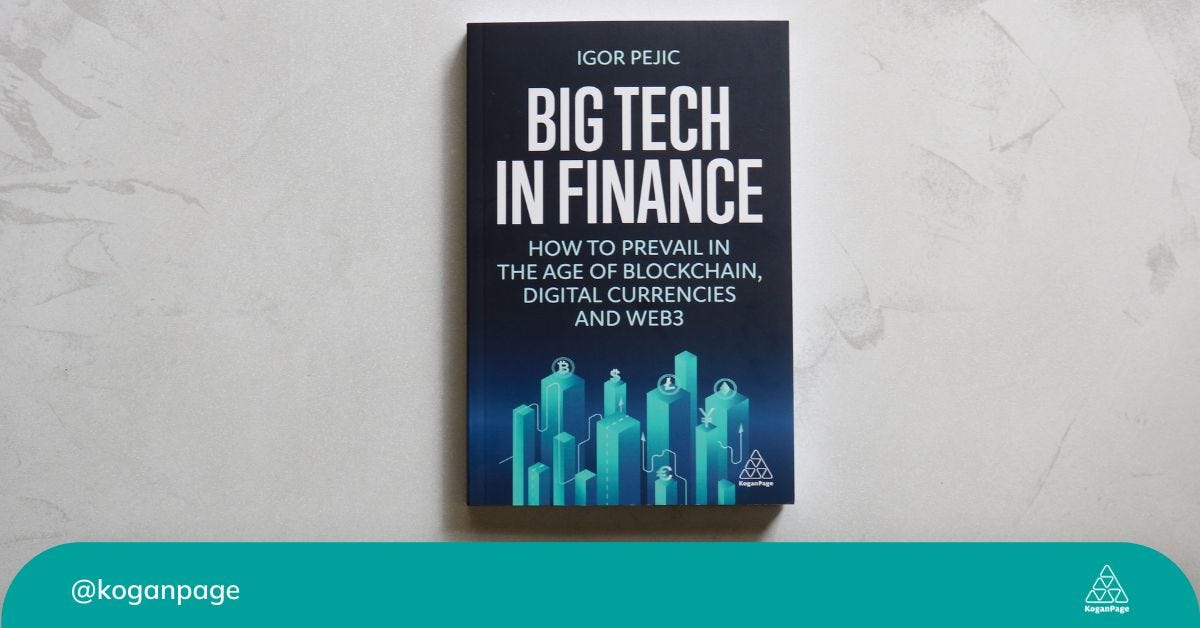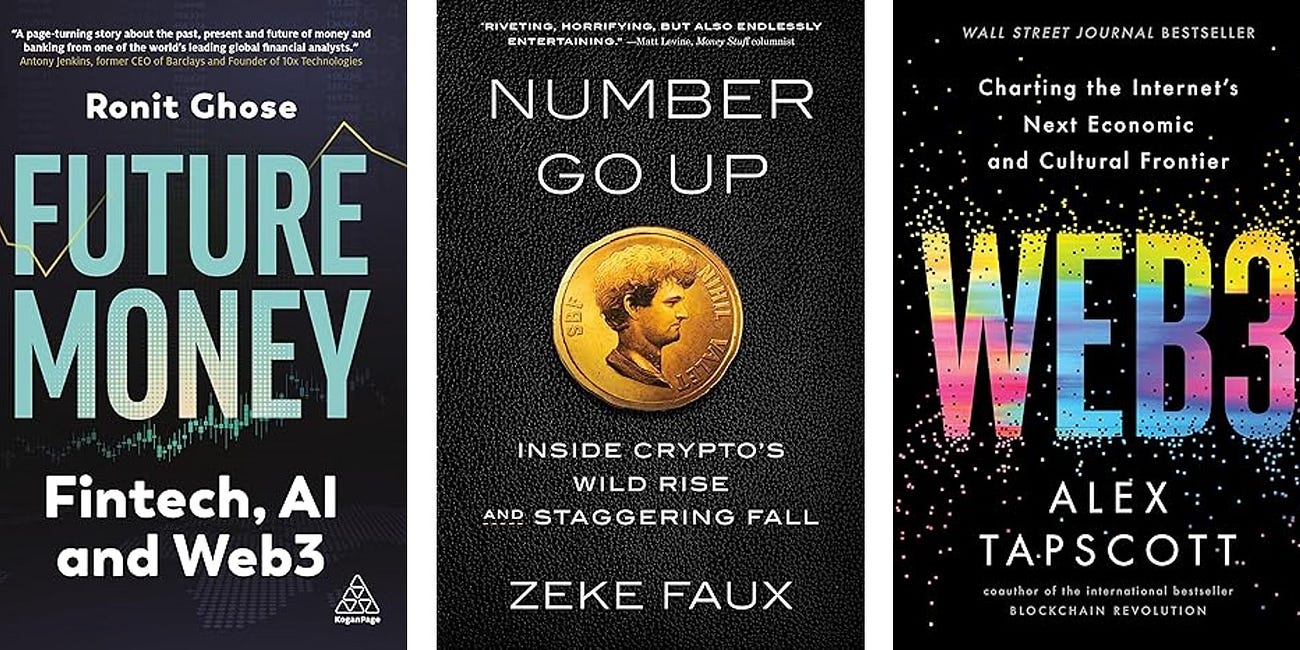The Money Book Circle series – Q2 2024 edition
A quarterly series on the hottest new books on finance and technology
On the go? No problem. We have you covered with the audio version:
Book #1: “The Algebra of Wealth: A Simple Formula for Financial Security” by Scott Galloway
In "The Algebra of Wealth," Professor Scott Galloway ditches the stuffy financial jargon and offers a refreshingly candid take on achieving financial security. This book isn't a collection of complex investment strategies, but rather a roadmap filled with practical steps and insightful hacks for building long-term wealth.
Galloway's core message is that financial success isn't a secret formula reserved for the privileged few. It's a product of smart decisions, hard work, and a bit of calculated risk-taking. He emphasizes the power of time and compound interest, urging readers to start investing early and consistently. The book unpacks this concept in a clear and engaging way, making it accessible even for financial novices.
Beyond traditional investment suggestions, Galloway delves into the often-overlooked aspects of wealth creation. He highlights the crucial role of career choices. According to him, aligning your skills with in-demand fields like technology or healthcare is key to securing a high-paying job – the bedrock of financial stability. The book offers guidance on identifying your strengths and pursuing a career path with long-term earning potential.
Galloway doesn't shy away from addressing the challenges of the modern economic landscape. He acknowledges the rising student loan burden, the ever-increasing cost of living, and the gig economy's uncertainties. However, instead of dwelling on anxieties, he provides actionable strategies for navigating these hurdles. From budgeting tips to debt repayment plans, the book equips readers with the tools to overcome financial obstacles.
While the book is packed with valuable information, its true strength lies in Galloway's engaging writing style. His sharp wit and insightful observations make complex financial concepts relatable and even entertaining. He injects humor and personal anecdotes throughout the book, keeping the reader engaged from cover to cover. Galloways’s voice as a writer is also the reason why I have been a fan of his other books too. I highly suggest that you also take a look at The Four: The Hidden DNA of Amazon, Apple, Facebook, and Google and – though it is not directly about tech and finance – Adrift: America in 100 charts.
"The Algebra of Wealth" might not be a substitute for professional financial advice, but it's an excellent starting point for anyone seeking to take control of their financial future. Whether you're a recent graduate or someone looking to optimize your financial strategy, Galloway's practical framework and clear-cut advice offer valuable insights for building lasting wealth.
Book #2: “The White Wall: How Big Finance Bankrupts Black America” by Emily Flitter
Emily Flitter’s book is not a typical fit for our quarterly picks. Those usually focus on the intersection of finance and technology, while the book revolves around discrimination in the financial sector. The White Wall does however hold a very valuable lesson for those working in fintech. In particular amidst the rise of (generative) artificial inteligence and other technologies, we do well to remember that no matter how neutral those systems seem to be, they are not. Also, it is a thoroughly researched and engagingly written book. And since the book is now available in paperback, I decided to include it on the list.
To be sure, I don’t believe there is more systemic discrimination in financial services than in other industries. On the contrary. That opinion stands even after having read and enjoyed Flitter’s book. That is not to say there is no discrimination in an industry that employs millions of people – after all The White Wall provides numerous examples of it. The book vividly describes many cases of employment discrimination. I just don’t believe it’s systematic.
Why it’s a valuable and timely read? Biases that can be found in individuals, just as well as historic datasets, can become systematic disadvantages when they meet a technology as untested as artificial intelligence. On the one hand we are not aware of all its dangers yet, and on the other we have hardly any experience in implementing it. An AI solution of any significant size absorbs all available resources of the project team and the IT departments. The number one goal is getting to a working solution, and getting there faster than the competition. The social impact is an afterthought at best. If you are not sure what could go wrong, read Flitter’s chapter on insurance and AI. Or just take a couple of minutes and play around with OpenAI’s ChatGPT or Google’s Gemini. Query some politically charged issues from both sides of the isle and it should quickly become clear how politically-biased large language models (LLMs) can be.
Even those of us studying and working at the intersection of finance and technology should be aware of the tremendous impact banking has not just on shareholders and customers in general, but on different social groups. Just as the books on the history of money highlight the amazing benefits of financial innovation to our lives, New York Times journalist Emily Flitter points out how the missing access to banking services and the way they are sometimes set up can put a certain group at a disadvantage. Flitter’s book is skillfully written, well-researched, and overall an enjoyable read.
Book #3: “Money in the Metaverse: Digital Assets, Online Identities, Spatial Computing and Why Virtual Worlds Mean Real Business” by David Birch and Victoria Richardson
It has been some time since the metaverse was in the news. Some have argued the idea has imploded completely. Still, its foundations – i.e. digital assets – remain as relevant as ever and are the building blocks of the related Web3 concept. David Birch and Victoria Richardson's Money in the Metaverse dives into the heart of the monetary system underpinning the metaverse, exploring its potential impact on business and commerce. The book unpacks complex concepts like digital assets, online identities, and spatial computing, making them understandable for both tech enthusiasts and those new to the virtual world.
One of the book's strengths is its clear structure. Birch and Richardson establish a foundational understanding of the metaverse, then delve into the various digital assets that will fuel its economy. They create a taxonomy – a system for classifying these assets – which provides a framework for comprehending the diverse virtual goods users will encounter. This includes everything from avatar clothing to virtual land ownership.
The concept of online identity takes center stage as well. The authors propose a "tried-and-tested model" for navigating this new landscape. Understanding how we represent ourselves virtually and the security considerations involved is crucial for safe and successful participation in the metaverse.
The book shines in its exploration of the real-world business opportunities presented by the metaverse. Birch and Richardson outline how companies can leverage virtual spaces for marketing, sales, and even creating entirely new revenue streams. They don't shy away from the challenges, however, acknowledging issues like data security and regulation that need to be addressed.
Overall, Money in the Metaverse is a valuable resource for anyone curious about the economic possibilities of this evolving virtual landscape. By untangling the complexities of digital assets, online identities, and spatial computing, the book equips readers with the knowledge to navigate the exciting, and potentially lucrative, world of the metaverse.
Almost exactly two years ago I have asked the question of what money will look like in the metaverse. I dubbed it MetaFi when I talked to Mark van Rijmenam, who had also just written a book on the metaverse. So make sure to check out the interview here in addition to getting a copy of Birch’s and Richardson’s book.
Interested in more books on finance and technology?
Start with the most profound change to come. For readers of The New Frontier it will come as no surprise that I see Big Tech’s entry into finance as the most transformative trend in decades. Nor will they be surprised to hear that I consider blockchain the most disruptive technology of the day. This is why I have dedicated one and a half years to intense research and analysis on what tech titans are doing with blockchain and how they will shape the future of money. The result is my latest book Big Tech in Finance: How to Prevail in the Age of Blockchain, Digital Currencies and Web3.
Can the Big Five – Google, Apple, Facebook, Microsoft, and Amazon – succeed in capturing the global financial system now that blockchain and decentralized finance are radically changing the way money works? Get a copy of Big Tech in Finance and find out!
Introducing "The Money Book Circle"
On the go? No problem. We have you covered with the audio version: Today I am launching a new series as part of The New Frontier. Every quarter I will make three suggestions on what you should read to keep up to date with the big ideas on the future of money
The 50 best books on tech and finance
One thing that comes with being an author is that you are continuously asked what books you can recommend in your area, in my case about tech and banking. So, over the years I have assembled a list of the 50 most important books every financial services professional should read. It includes essential volumes, some hidd…
Note: None of the content of this article and this newsletter, nor my books, presentations, and seminars is legal, tax, investment, financial, or investment advice. Nothing contained constitutes a solicitation, recommendation, endorsement, or offer to buy or sell any securities or other financial instruments. The content is gathered from publicly available information and the expertise of the author. It does not contain any insider information. Also, as an Amazon Associate I occasionally earn from qualifying purchases.







